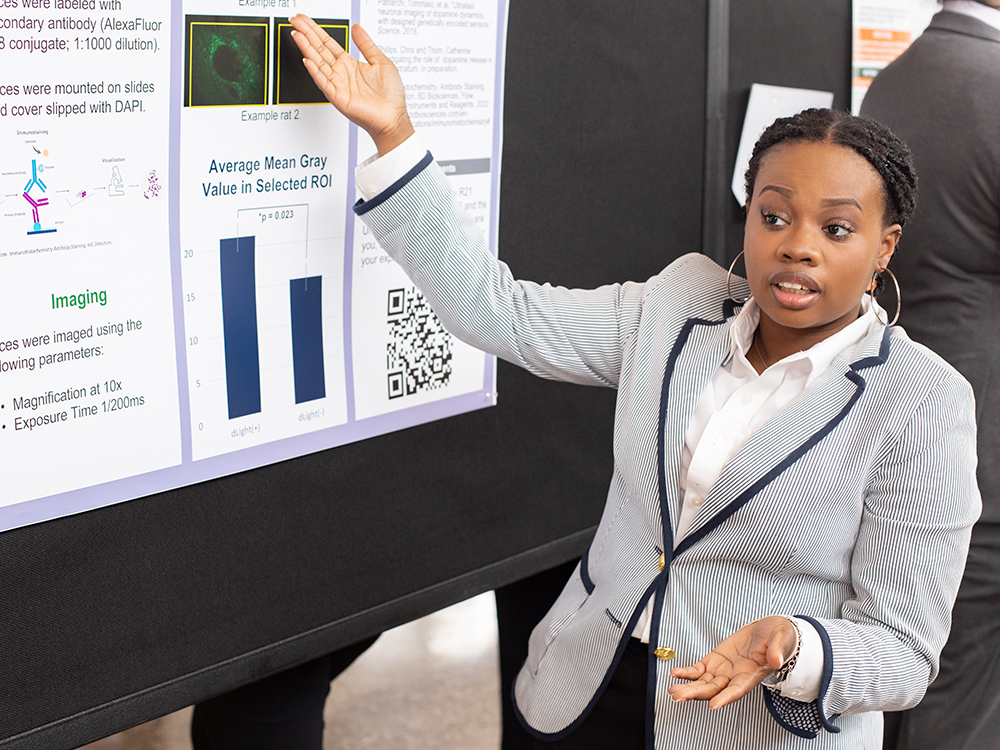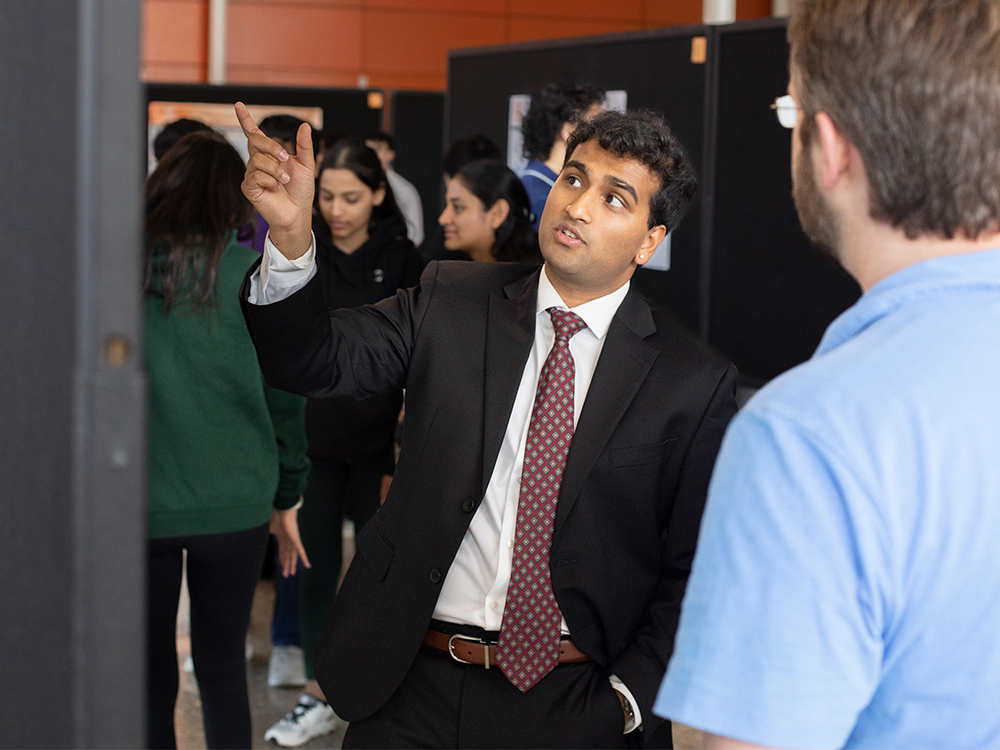Undergraduates Showcase Research, Creativity
05.08.2023
 Moni Akinsola, a neuroscience senior in the School of Behavioral and Brain Sciences, analyzed dLight expression in rat striatum. Dr. Catherine Thorn, an assistant professor of neuroscience, was the project’s principal investigator.
Moni Akinsola, a neuroscience senior in the School of Behavioral and Brain Sciences, analyzed dLight expression in rat striatum. Dr. Catherine Thorn, an assistant professor of neuroscience, was the project’s principal investigator.
The University of Texas at Dallas celebrated student research accomplishments and creativity April 24-28 as part of its annual Exhibition of Excellence in Undergraduate Research.
The event, coordinated by the Office of Undergraduate Education, is held in conjunction with Undergraduate Research Week, a nationwide initiative to highlight the importance of academic discovery among students.
“This event gives the campus community a chance to learn about and admire some of the amazing research our undergraduate students are doing,” said Dr. Jessica Murphy, dean of undergraduate education.
During the Undergraduate Research Scholar Awards Poster Contest, 77 students presented work on a wide range of subjects and gained valuable experience explaining it to judges and hundreds of attendees. Other events during the week included a research-focused resume workshop and an undergraduate research panel, in which students and faculty members shared their research experiences and tips.
“Panels and workshops offer students the opportunity to maximize their undergraduate experience with research and show them how they can incorporate their own research into professional materials and presentations,” said Murphy, the Mary McDermott Cook Chair for Undergraduate Education.
Poster contest finalist and chemistry senior TQ Nguyen’s research focused on determining where bacterial infections occur inside the body so medication can be precisely targeted.
“Bacteria have negatively charged cell walls, and healthy cells are neutral overall, so you can make a molecule that is positively charged and that will bind with the bacteria,” he said. “That gives precise information about the location of the infection. By finding the exact location, the most appropriate treatment can be delivered.”
 Varun Pasapula, a neuroscience senior in the School of Behavioral and Brain Sciences, researched the behavioral effects of vagus nerve stimulation-sound pairing in an animal model of Rett syndrome. The project’s principal investigator was Dr. Crystal Engineer, an assistant professor of neuroscience.
Varun Pasapula, a neuroscience senior in the School of Behavioral and Brain Sciences, researched the behavioral effects of vagus nerve stimulation-sound pairing in an animal model of Rett syndrome. The project’s principal investigator was Dr. Crystal Engineer, an assistant professor of neuroscience.
Other finalists used a cross-disciplinary approach. Sruthi Suresh, a molecular biology senior, collaborated with researchers in the School of Economic, Political and Policy Sciences to track public-health sentiment across social media. She used text analysis to determine what people in specific geographic areas were posting on Twitter about COVID-19 vaccines over time.
She found that tweets from the Dallas-Fort Worth area were mostly concerned with potential side effects of the vaccines and discussed the use of alternative, unproven therapeutics for COVID-19. Her research also showed a loss of confidence in vaccines that aligned with the pause in administration of the Johnson & Johnson vaccine after reports of blood clots, which proved to be rare.
In the Los Angeles area, however, tweets were most concerned with the social-justice aspects of vaccine availability.
Suresh, who plans to attend medical school, said this kind of research is important for health care providers.
“If I were a health care provider in Dallas-Fort Worth, this data means I might want to have conversations with patients about side effects of the vaccine and about the dangers of self-prescribing medications,” she said.
The poster contest winners, who each received a cash prize, were:
- First place: Finance and neuroscience junior Vrinda Sethi for “Positively Modulating the Sigma-2 Receptor Alleviates Neuropathic Pain by Reducing the Integrated Stress Response.”
- Second place: Biochemistry senior Neha Satish for “Surface-Modified Dendrimers for the Slow Release of Active Ingredients.”
- Third place: Biochemistry senior Andrew Vu for “Europium Oxide-Catalyzed Formation of Electrically Conductive Carbon for Hybrid Supercapacitors.”
–Jessica Good
Tags: Research, Students